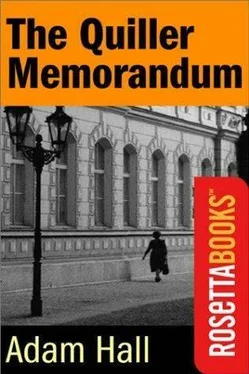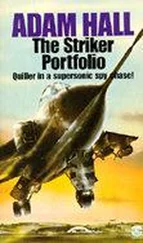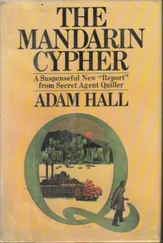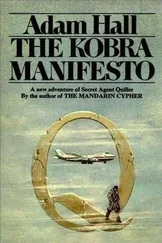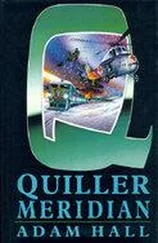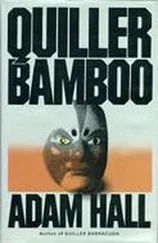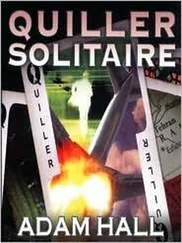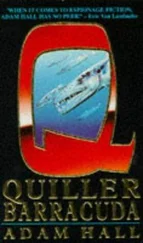In a few seconds the arm was unlocked from my neck and my legs were released and Oktober said:
"You may get up."
I was smart about it for decency's sake, and tucked my shirt in, making it look like the end of a dormitory rag. Breathing not too bad, didn't wheeze. Relax.
The little japan-lacquered table lay in four pieces and the anaesthetist was still gathering up his gear. One guard stood behind me: I could feel him there. Six men had come into the room and stood in a ring, each with a gun out. The other original guard was still on the carpet with his leg at a dreadful angle from the thigh and a puddle of vomit beside his blenched face. The psychoanalyst was standing outside the ring of men, looking straight at my face with the intensity of a painter who must commit what he sees to his canvas. Oktober stood stiffly, visibly accommodating his pain and refusing his groin the comfort of his hands. The colour was seeping back into his face but the sweat had gathered and dripped from his chin.
The anaesthetist had charged a smaller syringe and now stooped over the prone guard, lancing a vein in his leg, straightening up. No one spoke. I could hear Oktober's breathing; the pain was audible in it. My right arm was going numb from the blow of the table and the shoulder-blade throbbed. I'd got off lightly; they could have done much worse than this. The guards were well-trained: the orders must have been: He is not to be damaged unless absolutely necessary.
The anaesthetist nodded to Oktober, who said: " Two of you. Take him to Doktor Lowe. Then come back."
The guard was unconscious. They carried him with his legs together. The doors opened and closed. The anaesthetist was checking the damage to his kit. Oktober asked him what the situation was and he said: " We can proceed when you are ready, Herr Oktober."
The five remaining guards were signalled to close in and Oktober said to me: "Sit in the chair." There was no expression on the oblong face, no hate in the eyes. He would not wipe the sweat from his chin. It wasn't there. The pain wasn't there. I had done nothing to him.
I sat down again in the brocade chair and began thinking out the next move. Oktober said:
"Zander. Take aim at the left foot. Gebhardt, the right foot. Schell, the left hand. Braun, the right hand. Krosigk, aim at the genitals." I watched the little barrels line up. All catches were set at fire. "At the slightest movement, shoot. Do not wait for my order." He spoke to the anaesthetist. "Approach the patient from behind and work without covering any line of fire." To me he said: "Be careful not to move your hands or feet by the smallest degree, especially when the needle enters."
The smell of ether and soap came into the air as the man passed behind me and rolled up the sleeve of my shirt and cleansed the skin. I looked around me without moving my head. The psychoanalyst was still studying me, assessing his material. The five guards had their eyes fixed on the five targets; their fingers were curled on the triggers. I stopped thinking out the next move. There wasn't one.
"Proceed."
The needle went in.
The seven men looked very small but I knew the reason they had been ordered to post themselves in a line across the doors and put up their guns. Thus it was distance that diminished them, nothing else.
The watch indicated that fifteen minutes had passed since the injection and I now began checking on visual references the size of the seven men, the intensity of the light on the gold inlay of the console by the window, the height of the ceiling, other things. There was no question of my having been given a hallucinatory drug: they didn't want an outpouring of hallucinations, but the truth.
The room was very still. The great chandelier hung like a jewelled moon. The men made a tableau: seven guards at the far end of the room, motionless. Much nearer, Oktober, hands behind his back, feet slightly apart, motionless. Nearer still, the narcoanalyst, his stance neat but relaxed, fine head bowed a degree to look down at me, motionless.
Beside my chair, the anaesthetist, just out of sight.
My only friend was the watch. Now sixteen minutes since the injection. It wasn't my own watch, but his, the analyst's. Too involved with working on me he failed to take it into account that I was working on him, preparing to do what I could against the drug; he therefore made the mistake of folding his arms as he stood gazing at me. When reality starts slipping you must find something real to hold on to, a spar in the roughening sea. Man-made time is real, and measured in precise degrees: you may think an hour has passed but a watch will correct you if you're wrong. This watch helped me in three ways. It would correct any distorted estimation of the passage of time; it would, in correcting me, warn me that my own time-sense (and therefore the clarity of my wits) was becoming impaired and that an effort must be made to steady up; and it would provide an aid in trying to name the enemy: pentothal, amytal, hyoscine, or whatever was now in my bloodstream and lapping at my brain-cells. The time element varies greatly in different narcotic techniques.
I couldn't look at my own watch because they'd see me glance down and would realise the danger and take my watch away. I could see the analyst's watch easily and clearly because his arms were folded, and I let my gaze run periodically up and down his figure, from head to foot, with sleepy blinks, as if I were feeling the effects of a soporific. In between blinks I checked his watch. Now seventeen minutes.
There hadn't been a sound in the room for seventeen minutes, and now he spoke.
"My name's Fabian." It was said with a shy smile. "I don't know yours."
The anaesthetist was perched on a stool beside me and I could now see the white of his gown on the edge of my vision-field. He had strapped a constrictor round my right arm and would be checking my blood-pressure as we proceeded, to forewarn himself of any syncope. He was at this moment taking my pulse. He would also be listening the whole time to my breathing.
Genuine indications of sedation began now, so I counter-attacked at once, forcing alertness and busying myself with the problem: what was the drug they were using? Certainly it was in the barbiturate group, not the amphetamine: it was sleep-inducing and not stimulative. But pentothal would have acted faster than this. The first approach by the analyst gave me a clue: I was expected to feel the onset of urgent demands for sympathy with the interrogator. But the effects of any given narcotic vary according to the reaction against it. I would not, on an operation-table, want to wrestle mentally with a surgeon who was going to heal me. In this room and in this chair I was prepared to wrestle for my life.
To pin down the drug that was in me, I would have to set up a complicated permutation of effects and reactions in these circumstances, and test each possible drug for assumed reactions according to the known characteristics of my own personality.
It wasn't worth it.
Steady. It's worth anything. You can kill men if you're not careful, men like Kenneth Lindsay Jones.
The eyelids were heavy. He was watching me, waiting for my answer. The hand of the watch had hardly moved. He had only just spoken. My name's Fabian… I don't know yours. Make correction and be warned: five minutes had seemed to pass, within thirty seconds.
Say it sharply, briskly.
"Quiller." Not bad.
"And your first name?"
First names. Sympathy. Only one answer: bollocks.
Said nothing.
Think clearly. If it were pentothal it wouldn't be too much to cope with. He'd start his questions any minute now, and catch me in the twilight before sleep, off guard, then question me again in the twilight of waking.
Читать дальше
